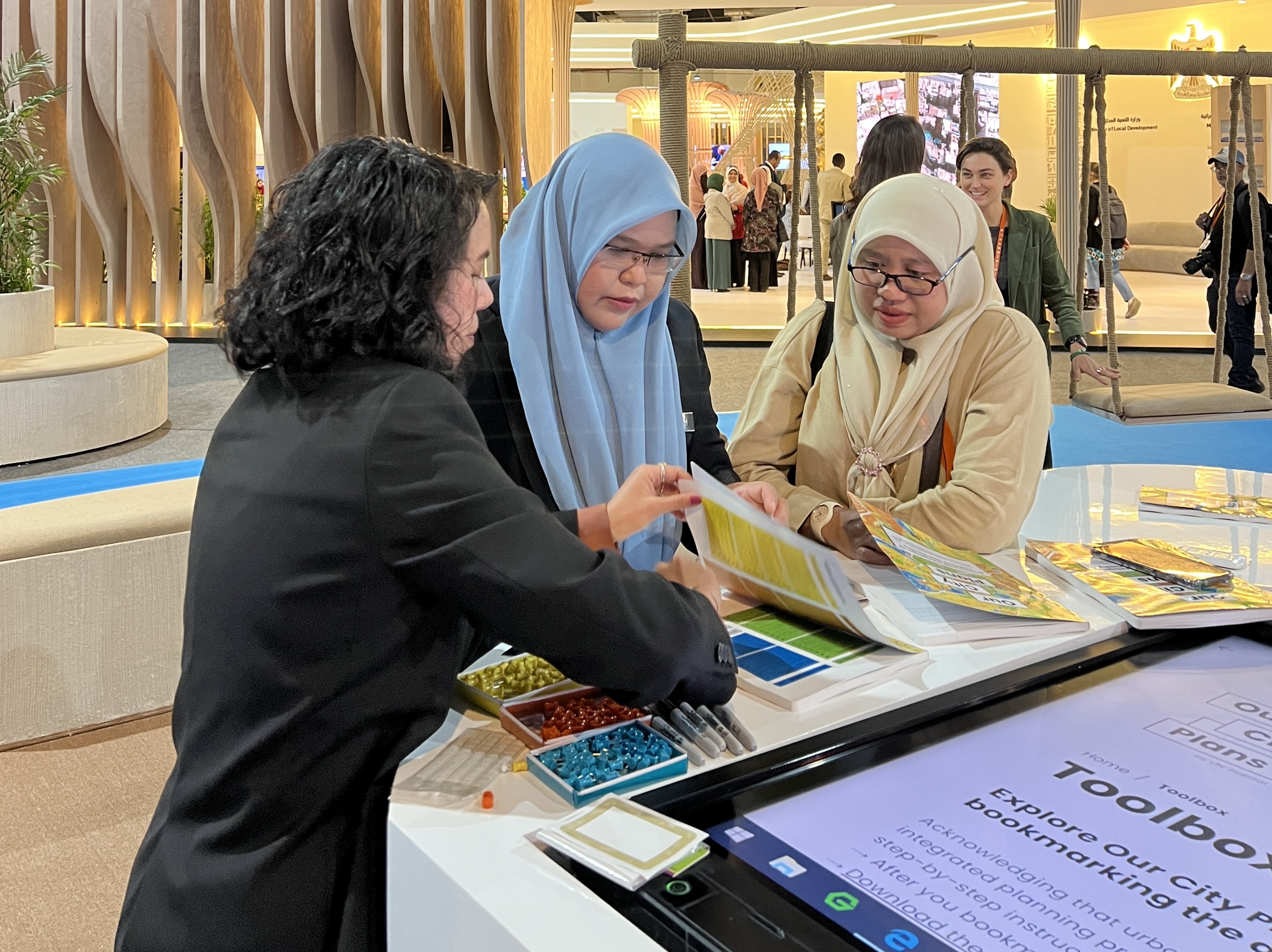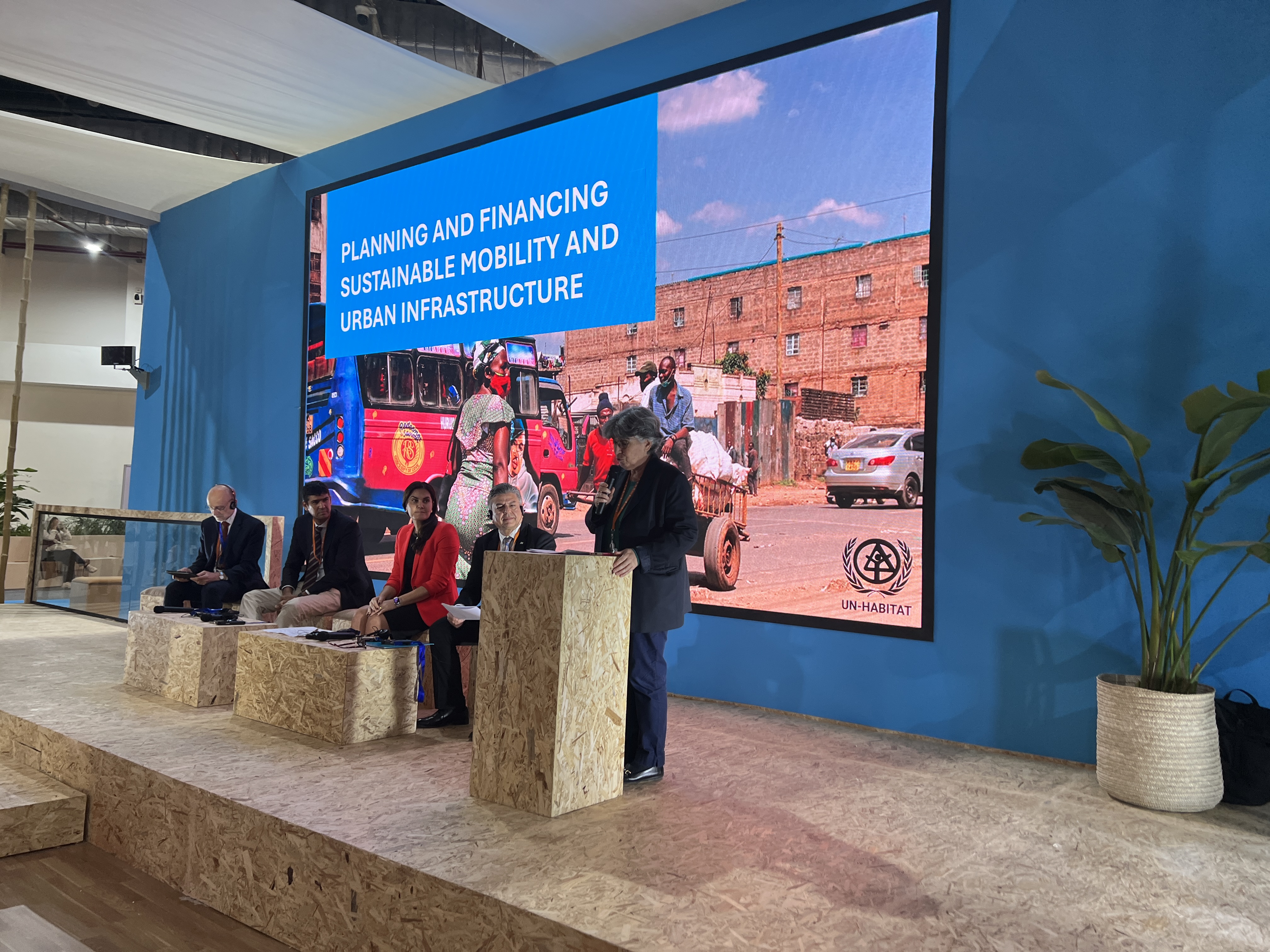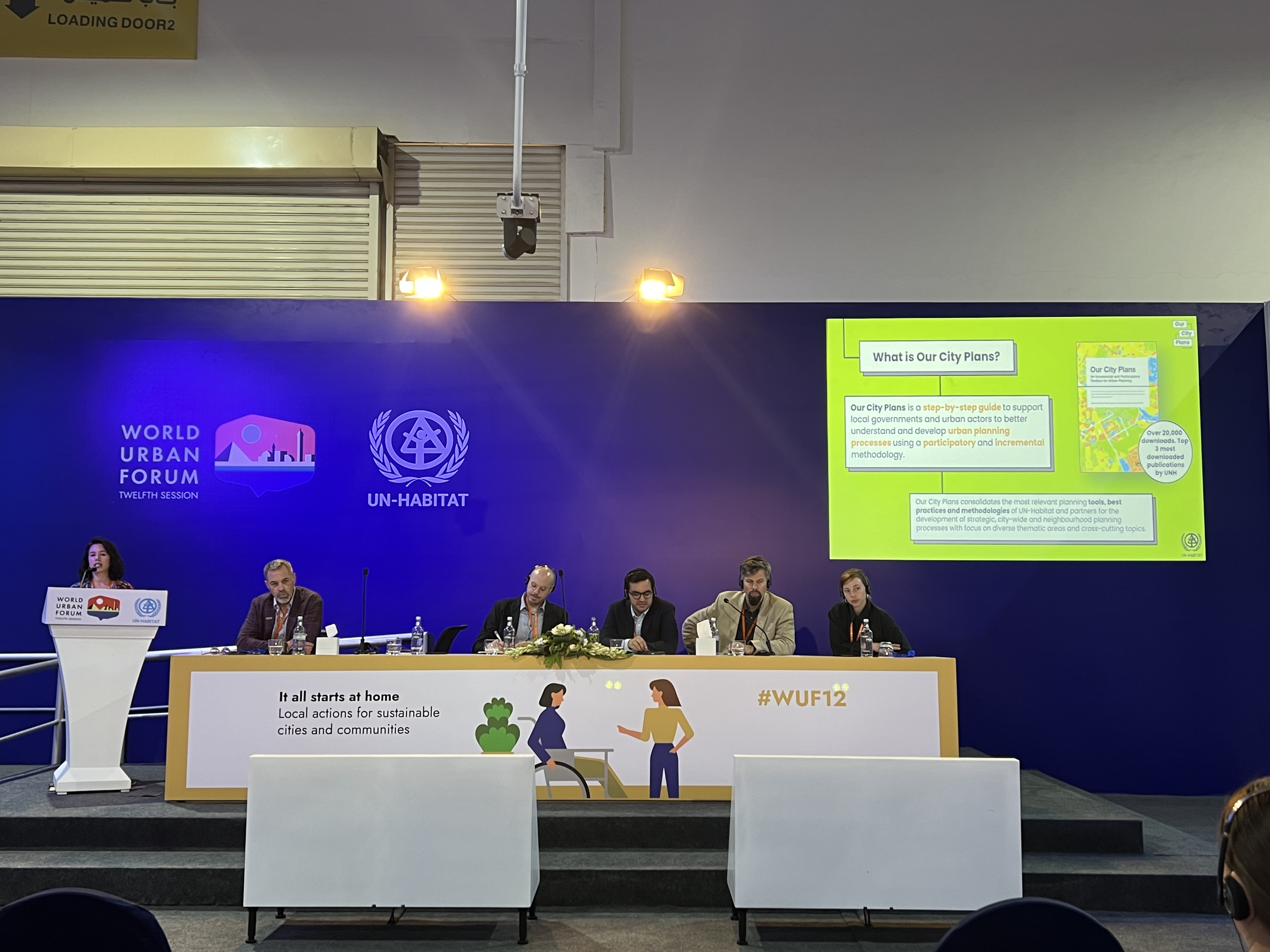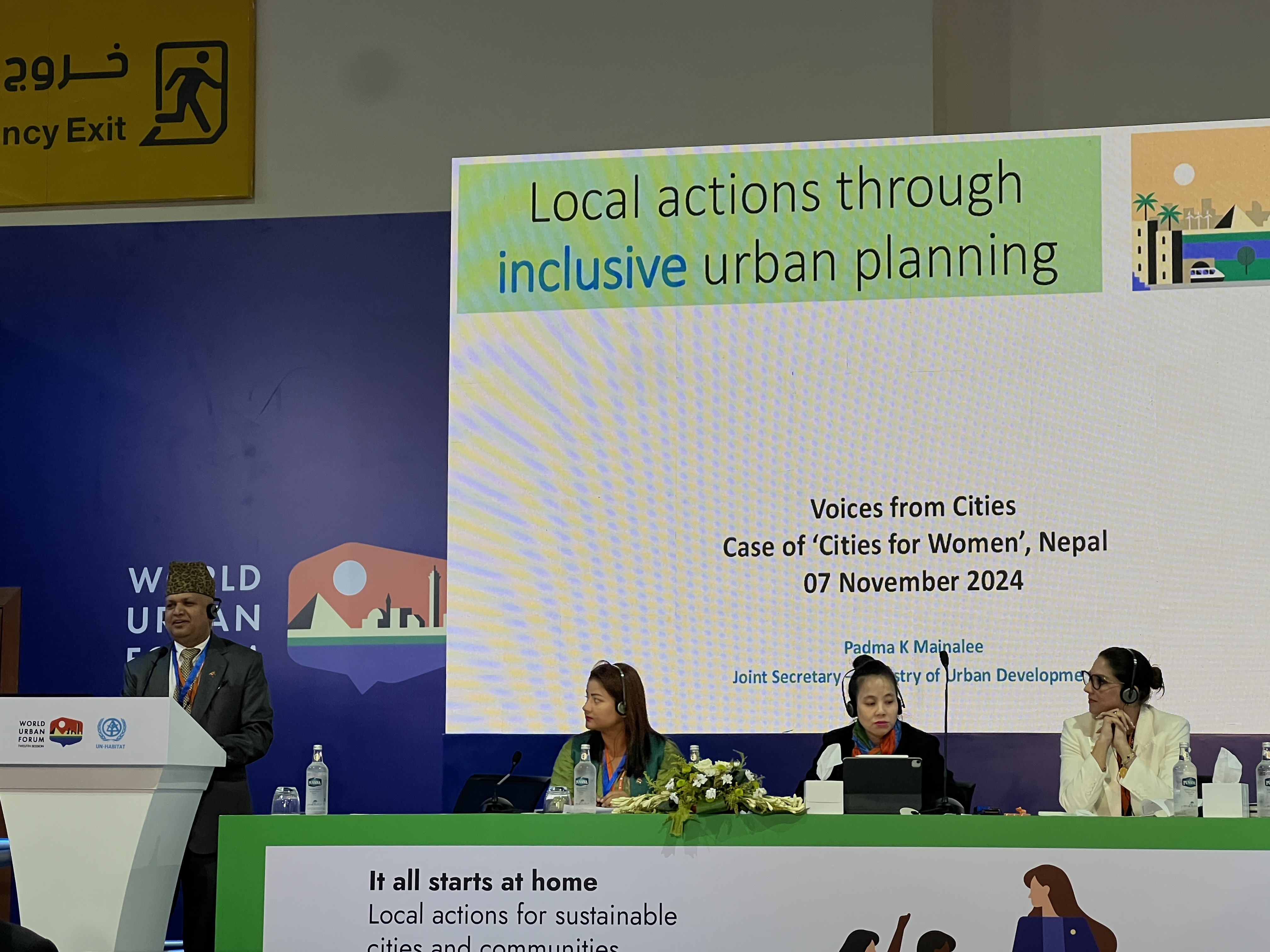
The 12th session of the World Urban Forum (WUF12) in Cairo served as a global stage for groundbreaking discussions on inclusive and sustainable urban development. Among the highlights was Our City Plans, which played a central role in multiple events, showcasing its transformative potential to encourage enhance inclusive urban planning, localize the Sustainable Development Goals (SDGs) and the New Urban Agenda.
Let us explore the key moments and events where Our City Plans and peer advocates and organizations distinguished themselves and solidified their role in advancing participatory urban planning.

A Hub of Engagement at the Urban Playground
Our City Plans took center stage at the vibrant Urban Playground, where we engaged with aspiring urban planners, stakeholders, and government representatives from around the world. Our interactive space became a hub of collaboration, innovation, and storytelling, emphasizing the transformative power of inclusive urban planning. Participants contributed to a giant civic engagement map, pinpointing their cities and sparking meaningful discussions about challenges and opportunities in fostering community participation. These interactions inspired urban planners to explore the Our City Plans toolbox, fostered collaboration with stakeholders on implementing SDG 11.3.2, and connected us with government representatives advocating for increased civic engagement. The enthusiasm and ideas shared reaffirmed the importance of empowering communities to shape their urban futures.

Focusing on Sustainable Infrastructure and Mobility
In the session on Planning and Financing Sustainable Mobility and Urban Infrastructure, Our City Plans was spotlighted as a flexible and scalable approach to integrated planning. The event on Resolution 8 brought together global leaders and experts to tackle some of the most pressing challenges in urban development:
- Integrated urban planning,
- Financial mechanisms, and
- Capacity building for sustainable infrastructure.
Laura Petrella kicked things off with welcoming remarks, and Javier Torner set the stage by introducing the resolution and guiding the discussions.
Tomas Vaquero, Honduras’ Minister of Governance, shared powerful insights on how countries like Yemen and Sudan are showing resilience in the face of conflict and climate change, emphasizing the need for strong leadership and community-driven urban planning.
Émilie Potvin, Director of Partnerships and Global Portfolios at UNOPS, highlighted how infrastructure is key to achieving 92% of the SDGs, using examples like rebuilding Beirut after the 2020 port explosion.
Thierno Habib Hann, Managing Director/CEO at Shelter Afrique, painted a vivid picture of Africa’s housing and infrastructure challenges, calling for bold, green solutions to close massive funding gaps.
Meanwhile, Stefan Atchia, Manager for the Urban Development Division at the African Development Bank urged for smarter investments to match Africa’s booming urban growth.
Wrapping up, Simon Stevens, Head of Cities and Infrastructure in the UK Foreign, Commonwealth and Development Office (FCDO), showcased global projects helping cities prepare for climate change, from flood resilience in the Philippines to green urban planning in Vietnam.
The speakers left the audience with actionable ideas to drive sustainable urban transformation.
Click here to watch the full session.

Strengthening Communities Through Collaborative Planning
The "Stronger Communities, Better Cities: The Power of Planning Together" event brought together global leaders and urban experts to explore the transformative potential of participatory planning in building sustainable cities.
Key initiatives discussed included UN-Habitat's Our City Plans Platform, a digital tool that helps cities track civic engagement in urban planning and contributes to SDG 11.3.2 by empowering local stakeholders.
Frank D’Hondt highlighted ISOCARP's Planning System Assessment as a tool that strengthens local planning frameworks through global expertise.
The role of Citizen’s Assemblies in democratizing urban decision-making was emphasized by DemocracyNext’s James MacDonald-Nelson demonstrating how these assemblies shift power dynamics and encourage citizen-led solutions.
Ethan Kent from PlacemakingX and Luciana Renner from Fundación Placemaking Mexico focused on how community-driven placemaking and participatory urban regeneration can reach for more inclusive urban spaces.
Lastly, Guillermo Bernal from The Place Institute discussed the impact of well-designed public spaces on social equity and cohesion, advocating for spaces that prioritize people over cars.
The event highlighted how integrating participatory practices into urban planning can drive positive change, ensuring cities are inclusive, resilient, and aligned with sustainable development goals.

Localizing Global Methodologies in Nepal and Vietnam
A key event, "Local actions through inclusive urban planning practices for sustainable development of cities" , explored Our City Plans' customization and implementation in countries like Nepal, Vietnam, and Argentina, with additional insights from Mexico.
The session opened with an introduction to the Our City Plans Toolbox by Daniela Chong (UN-Habitat), showcasing its role as a step-by-step guide for municipal planning in capacity-constrained contexts. A case study from Argentina demonstrated its practical application in developing tailored urban plans.
Key presentations included:
Nepal: Padma Kumar Mainalee from the Ministry of Urban Development outlined efforts to create municipal planning guidelines, emphasizing the role of participatory approaches at the local level.
Mexico: Romy Rojas Garrido, President of CONARED, highlighted the process of adapting urban planning frameworks to address national and local challenges.
A dynamic panel discussion followed, moderated by UN-Habitat’s Daniela Chong and Pragya Pradhan, featuring insights from:
- Frank D’hondt (ISOCARP): Emphasized the critical role of community participation and strategies for avoiding tokenism in urban planning.
- Sushila Shahi (Lamki Chuha Municipality, Nepal): Shared the challenges and successes of integrating urban planning into municipal processes.
- Dr. Trinh Tu Anh (Vietnam): Discussed the contextualization and implementation of participatory methodologies in Vietnam.
The event closed with reflections on the importance of participatory planning as a bridge between global frameworks and local action and demonstrated how the Our City Plans Toolbox is not only a methodology but a catalyst for reshaping urban planning to meet the unique needs of cities worldwide.
A Shared Vision for Sustainable Cities
At WUF12, Our City Plans reinforced its mission to empower local governments and communities, offering practical tools to address capacity constraints while building resilient and inclusive cities. As the global urban community looks ahead, the lessons shared in Cairo provide a roadmap for leveraging participatory planning to achieve the SDGs and beyond.